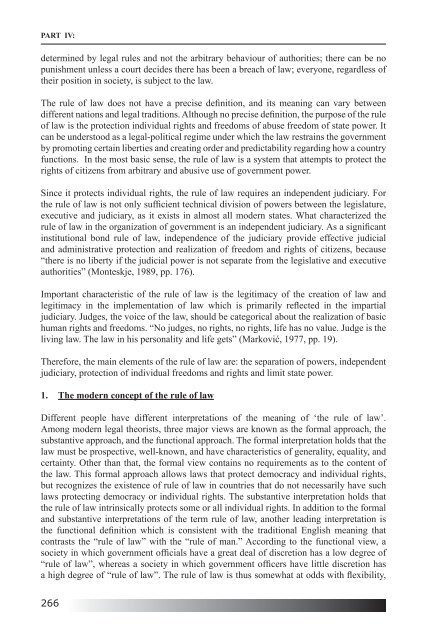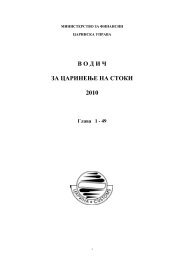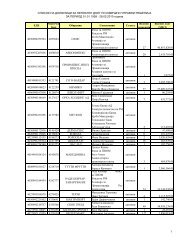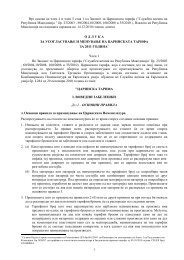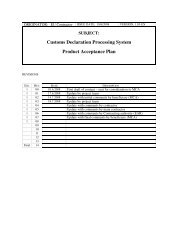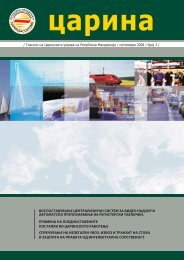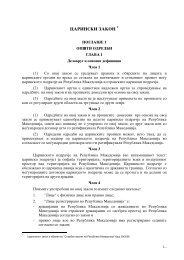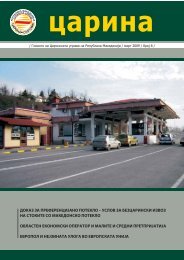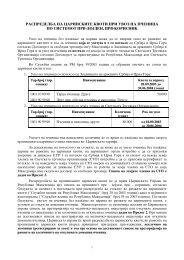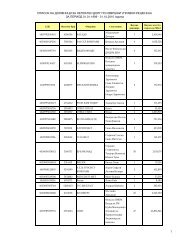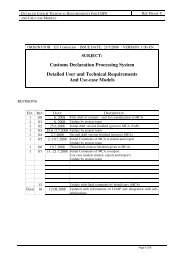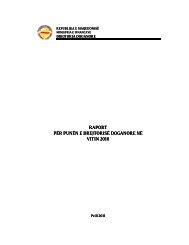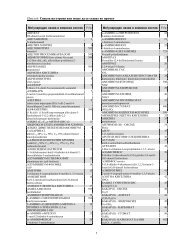REGIONAL COOPERATION AND ECONOMIC INTEGRATION
REGIONAL COOPERATION AND ECONOMIC INTEGRATION
REGIONAL COOPERATION AND ECONOMIC INTEGRATION
- No tags were found...
You also want an ePaper? Increase the reach of your titles
YUMPU automatically turns print PDFs into web optimized ePapers that Google loves.
PART IV:<br />
determined by legal rules and not the arbitrary behaviour of authorities; there can be no<br />
punishment unless a court decides there has been a breach of law; everyone, regardless of<br />
their position in society, is subject to the law.<br />
The rule of law does not have a precise definition, and its meaning can vary between<br />
different nations and legal traditions. Although no precise definition, the purpose of the rule<br />
of law is the protection individual rights and freedoms of abuse freedom of state power. It<br />
can be understood as a legal-political regime under which the law restrains the government<br />
by promoting certain liberties and creating order and predictability regarding how a country<br />
functions. In the most basic sense, the rule of law is a system that attempts to protect the<br />
rights of citizens from arbitrary and abusive use of government power.<br />
Since it protects individual rights, the rule of law requires an independent judiciary. For<br />
the rule of law is not only sufficient technical division of powers between the legislature,<br />
executive and judiciary, as it exists in almost all modern states. What characterized the<br />
rule of law in the organization of government is an independent judiciary. As a significant<br />
institutional bond rule of law, independence of the judiciary provide effective judicial<br />
and administrative protection and realization of freedom and rights of citizens, because<br />
“there is no liberty if the judicial power is not separate from the legislative and executive<br />
authorities” (Monteskje, 1989, pp. 176).<br />
Important characteristic of the rule of law is the legitimacy of the creation of law and<br />
legitimacy in the implementation of law which is primarily reflected in the impartial<br />
judiciary. Judges, the voice of the law, should be categorical about the realization of basic<br />
human rights and freedoms. “No judges, no rights, no rights, life has no value. Judge is the<br />
living law. The law in his personality and life gets” (Marković, 1977, pp. 19).<br />
Therefore, the main elements of the rule of law are: the separation of powers, independent<br />
judiciary, protection of individual freedoms and rights and limit state power.<br />
1. The modern concept of the rule of law<br />
Different people have different interpretations of the meaning of ‘the rule of law’.<br />
Among modern legal theorists, three major views are known as the formal approach, the<br />
substantive approach, and the functional approach. The formal interpretation holds that the<br />
law must be prospective, well-known, and have characteristics of generality, equality, and<br />
certainty. Other than that, the formal view contains no requirements as to the content of<br />
the law. This formal approach allows laws that protect democracy and individual rights,<br />
but recognizes the existence of rule of law in countries that do not necessarily have such<br />
laws protecting democracy or individual rights. The substantive interpretation holds that<br />
the rule of law intrinsically protects some or all individual rights. In addition to the formal<br />
and substantive interpretations of the term rule of law, another leading interpretation is<br />
the functional definition which is consistent with the traditional English meaning that<br />
contrasts the “rule of law” with the “rule of man.” According to the functional view, a<br />
society in which government officials have a great deal of discretion has a low degree of<br />
“rule of law”, whereas a society in which government officers have little discretion has<br />
a high degree of “rule of law”. The rule of law is thus somewhat at odds with flexibility,<br />
266


